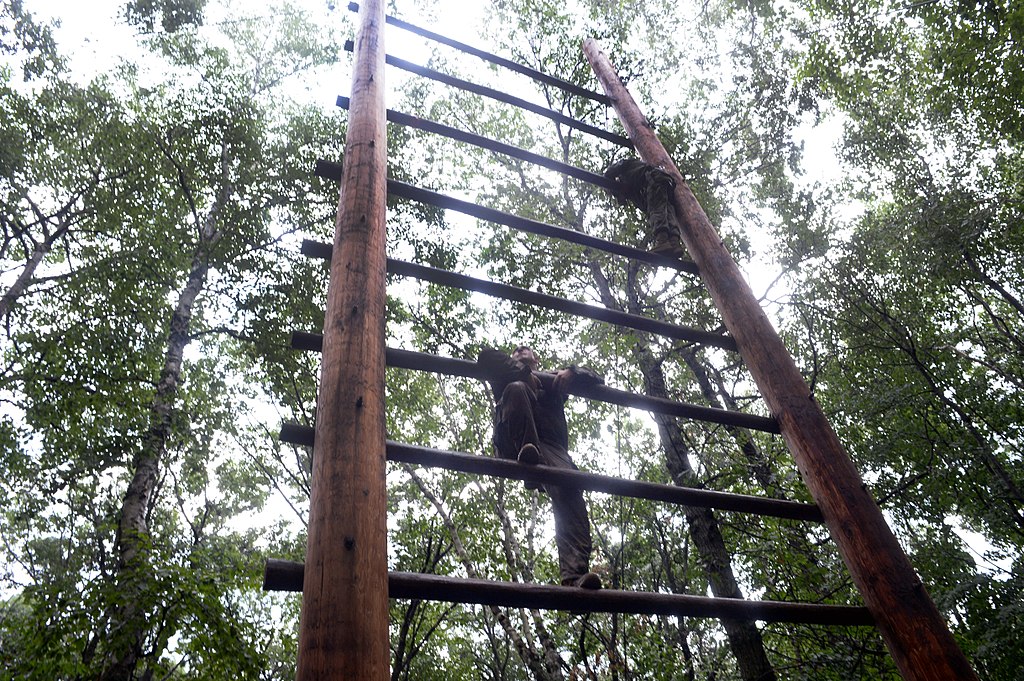In Army training, we sometimes visited the confidence course.
The confidence course is like a giant playground of walls to jump over, beams to walk across, ropes to climb and a giant ladder to climb. It’s the kind of thing you always see in a montage of soldiers training in movies.
But to be honest, in the four years I was in the Army, I only visited the confidence course a handful of times. Once or twice in Basic Training and a few times in AIT. I was a linguist, after all, and not infantry. I remember thinking I was probably more scared than the other soldiers in my platoon as we stood getting our briefing of how to attack it. In retrospect, they were probably just as scared as me but didn’t show it. It’s funny how we can see every raw nerve we have but not the nerves of others.
And, yeah, of my 48 years so far, I still think back a lot to the Army days. They were formative. And sometimes, things from the Army just pop into my head in real life.
For example, I always think of the confidence ladder.

Okay, I don’t know if that’s what it’s actually called. I think it might be called “Jacob’s Ladder”. But it is a giant ladder that climbs into the sky. You climb up one end and down the other. The top is the most terrifying part of it.
At the bottom of the ladder, it’s easy. You just climb. If you fall, you fall.
But as you get higher, you have further to fall. Your muscles seize up. Your fear stops you from going higher. I can tell you that I don’t know if I would have been able to get over the top if it weren’t for the shouting drill sergeant at the bottom. If he weren’t there, I’d probably congratulate myself on how high I’d climbed and not gone any further. After all, I was going to be a linguist— not a Ranger! But I did get over it. But even as I sit here decades later thinking about it, it still makes my breath shallower and a feeling of dread overcomes me ever so slightly.
So, why do I still think about it? Because it still applies to me every day.
Early progress is easy when there is little to lose. That’s why we tinker and try new things. A new skill, a new app, a new product, a new video. If it fails, all we suffer is a little embarrassment. If it succeeds, though, that’s awesome.
And success leads to momentum. We continue to climb. We get better and better and look back at the initial resistance we had. We see that resistance in others and wonder why they can’t move out of their comfort zone and do the same.
But then, we slow down. And maybe we stop. We got too high on the ladder. The next rung looks too far away. We congratulate ourselves on how high we climbed.
That’s good enough, right?
Deep down, however, we know we should still be climbing. But there is so far to fall now if we slip up.
I wish I could say that I didn’t feel this way.
When my big app started to get very successful, I didn’t want to change it. It had hundreds of thousands of daily users. Why change it? But I should have kept growing it. Logically, I knew I had to keep evolving it and growing it. But, I could lose so much if I messed up. I can kick myself for not doing more when I look back on it now.
For years, I was putting out content every day on my YouTube channel. When the subscriber count was low, it was easy. Not many were watching. But as it grew, I became more cautious. I started thinking about delivering only what people wanted rather than what I wanted to give them. And my daily postings are now at once or twice a week. I need to work on this. It bothers me that I’ve froze.
It’s that ladder. The higher you get the safer you get.
There is a reason we equate youth with enthusiasm. I used to think it had to do with energy. And maybe it does. But I think it also has a lot to do with that ladder. When we are young, we have little to lose. And failure is easily forgiven. When we get older, with family and colleagues who depend on us, we get safe.